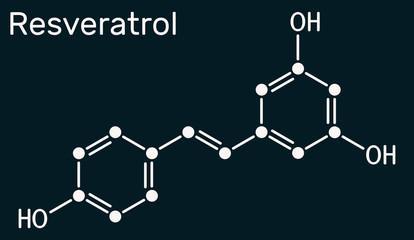Inflammation is one of the natural defense mechanisms against the presence of foreign substances in the body, such as splinters and pathogens.
However, inflammation may also occur without inherent threats to the body. The condition results from an overstimulated immune system.
Without prompt medical intervention, an overactive immune system might degenerate into chronic inflammation. This could further set the stage for a slew of other chronic diseases.
Fortunately, inflammation is treatable. The conventional way to manage the condition is using a class of medications called non-steroidal anti-inflammatory drugs (NSADs).
But while reasonably effective, NSADs are notorious for their high propensity to side effects. A less worrisome way to fight inflammation would be through alternative treatments, such as using trans-resveratrol.
Here’s everything to know about one of the most effective natural anti-inflammatory compounds.

About Trans-resveratrol
Trans-resveratrol is an isomer of resveratrol, a naturally-occurring phenol, and a phytoalexin belonging to the stilbenoid group. The compound, as with its other cousin, cis-resveratrol, is typically produced in response to a disease or injury.
Studies have observed significantly high trans-resveratrol levels in plants invaded by fungi and bacteria compared to their healthier counterparts.

Trans resveratrol benefits are broad-spectrum. The compound possesses immense antioxidant, anti-inflammatory, antifungal, antibacterial, and antimicrobial properties. That explains the surging demand for trans-resveratrol supplements in the recent past.
Which Plants Secrete Trans-resveratrol?
Trans-resveratrol has been identified in at least 70 distinct plant species. The compound is typically high in grapes, with significant traces detected in red wine and other grape-derived human foods.
Research has also uncovered substantial levels of trans-resveratrol in berries (such as blueberries, mulberries, and raspberries) and peanuts.
While trans-resveratrol may be present in nearly all parts of the plants that secrete it, the substance tends to be concentrated around the skin and seeds. Besides its natural occurrence, trans-resveratrol is also available in dietary supplements.
Comparing Trans-resveratrol and Cis-resveratrol
Both trans-resveratrol and cis-resveratrol are isomers of resveratrol, which means they share the same chemical formula but with slightly different molecular structures.
Another major difference between the two compounds relates to their bioavailability. Trans-resveratrol absorbs faster and more effectively into the bloodstream than both cis-resveratrol and resveratrol.
Both trans-resveratrol and cis-resveratrol exist naturally and in dietary products. However, trans-resveratrol is mostly available in smoothies and dairy products, whereas cis-resveratrol is more abundant in dark chocolate and red wine.
Exploring Trans-resveratrol’s Anti-inflammatory Properties
Trans-resveratrol’s anti-inflammatory effects are one of the primary reasons fueling its popularity.
Both medical studies and anecdotal reports have found that stilbenoids – the broader botanical group that trans-resveratrol belongs to – may alleviate various anti-inflammatory conditions. But just how do these compounds work against inflammatory flare-ups?
Research has shown that when consumed, stilbenoids like trans-resveratrol exert their anti-inflammatory effects by targeting 5-lipoxygenase (5-LOX), cyclooxygenase (COX), and protein kinase B, all of which play crucial roles in suppressing the body’s inflammatory messenger activity.
Trans-resveratrol combats inflammation both proactively and reactively. The compound reduces the secretion of inflammatory factors by inhibiting the activation of microglia, thereby minimizing the occurrence of inflammation. It also suppresses the expression of already-released inflammatory messengers by desensitizing the pathways followed by these signals, making it particularly effective for people already battling inflammation.

Studies have also established trans-resveratrol’s inhibitory effects on inflammatory messengers that act on various body organs. The compound has proven incredibly effective against respiratory inflammation, neuroinflammation, ear edema, and even swelling induced by proliferating cancerous cells.
Other Potential Benefits of Trans-resveratrol
1. Preventing Neurodegenerative Diseases
Trans-resveratrol has proven effective at preventing and managing neuroinflammation.
That makes it a potential remedy for neurodegenerative diseases like Alzheimer’s disease, Parkinson’s disease, and Huntington’s disease.
2. Improving Cognitive Functions
There’s an abundance of research citing trans-resveratrol for its efficacy against cognitive decline.
One mice study found that this stilbenoid could deactivate the neuroinflammatory response induced by intracerebral hemorrhage. Researchers inferred that those neuroprotective properties could help improve cognitive performance.
3. Supporting Cardiovascular Health
Nearly all stilbenoids have demonstrated a remarkable ability to aid cardiovascular health, and trans-resveratrol is no exception.
Studies involving diabetic rat subjects found that administering trans-resveratrol supported heart health by reducing cardiovascular inflammation and accelerating the functional abilities of progenitor cell compartments.
4. Fighting Other Chronic Infections
Not only is trans-resveratrol a powerful anti-inflammatory supplement. The compound also possesses antioxidant properties and might help to keep various chronic diseases at bay.
As with most antioxidants, trans-resveratrol guards against diseases by reducing oxidative stress to cells due to an excess build-up of free radicals.
How Much Trans-resveratrol To Take For Inflammation?
Trans-resveratrol has no standard dosage. That’s partly because the compound triggers no worrisome side effects. Serving amounts would depend on factors like your age, the substance’s potency, and the severity of the anti-inflammatory disorder you’re trying to remedy.
As a general rule, start with lower doses, say 5 milligrams per day, and then work your way up gradually.
However, it’s worth noting that the safety of trans-resveratrol depends on its occurrence. While the compound is nearly 100% safe in its natural form, the same cannot be said about supplements.

The potential risks of trans-resveratrol supplements mainly come from other additives in the dietary product. Always remember to read the ingredients in such products carefully before taking them.
Summary
Trans-resveratrol is a powerful stilbenoid whose anti-inflammatory properties are well-documented. The compound can also provide other therapeutic benefits, including supporting cardiovascular health, preventing cancer growth, and improving cognitive functions. And with no severe adverse effects reported, it’s understandable why trans-resveratrol has become the go-to supplement for alternative medicine enthusiasts.


